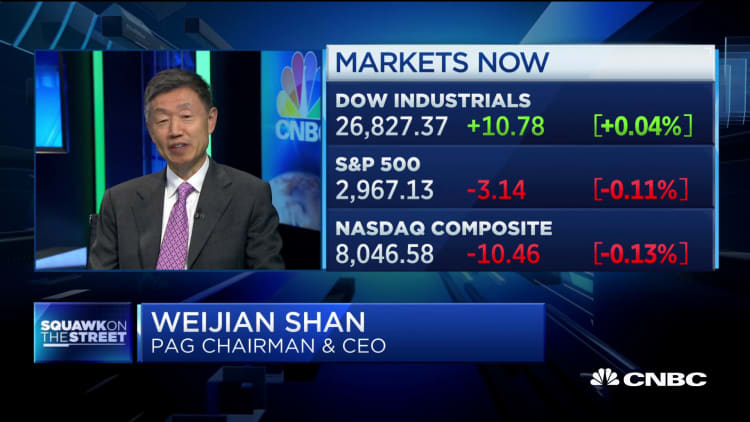
The U.S. economy is being hit harder than the Chinese economy by the long-running trade war between Washington and Beijing, influential Chinese financier Weijian Shan told CNBC on Monday.
"Both parties lose from the trade war, but the numbers suggest that the damage to the U.S. side is greater, in percentage terms, than to the Chinese economy," said Shan, a U.S.-trained economist and chairman and CEO of Asian private equity giant PAG. PAG has offices in China and Hong Kong and about $30 billion of assets under management.
"That doesn't mean that the Chinese economy is not severely damaged. ... For China, the business confidence in particular has been hit very hard in the past 15 months," Shan said on "Squawk on the Street." He spoke just hours after reports that China wants another round of talks before signing what President Donald Trump called last week the first phase of a trade deal between the two nations.
Trump said on Friday that China agreed to buy more U.S. agricultural products and made a commitment to address intellectual property concerns. The U.S. agreed to hold off on a tariff rate hike that was supposed to go into effect Tuesday.
Earlier Monday, Treasury Secretary Steven Mnuchin on CNBC would not comment directly on the status of the deal, but said it's a "fundamental agreement in principle" that's "subject to documentation." Mnuchin said he expects "phase one will close." But if it doesn't, he said a new round of tariffs on Chinese goods, set for mid-December, would take effect.
"They've reached an understanding, but the devil is in the details, so they have to work out the details and agree on paper," Shan said, noting how positive signs in June quickly devolved into additional tariff hikes. Both sides are hoping Trump and Chinese President Xi Jinping are able to meet and sign the phase one of the trade deal at the Asia-Pacific Economic Cooperation summit next month in Chile.
Shan's argument that the U.S. has seen greater impacts from the trade war were the subject of an op-ed in "Foreign Affairs" with the headline: "The Unwinnable Trade War." Throughout the escalating trade dispute, both China and the U.S. have been saying that the other's economy is bearing the brunt of the tariffs.
However, Shan wrote, "The tariffs did not compel Chinese exporters to reduce their prices; instead, the full cost of the tariffs hit American consumers."
He also pointed to China's decision to only place tariffs on U.S. goods that can be replaced with imports from other countries at similar prices."
"It actually lowered duties for those U.S. products that can't be bought elsewhere more cheaply, such as semiconductors and pharmaceuticals," he wrote. "Consequently, China's import prices for the same products have dropped overall, in spite of higher tariffs on U.S. imports."
Shan acknowledged on CNBC the trade war has "accelerated" the process, already underway, of companies moving supply chains out of China into Southeast Asian countries. "It's having some impact on the Chinese economy, but it is not going to be very substantial."



